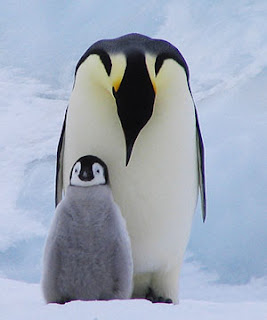
Although
March of the Penguins is a documentary of sorts distributed by National Geographic Feature Films, I was pleasantly surprised to see that the feature itself had no major evolutionary overtones.
Even the introduction mentions the penguins’ mating pattern as an event occurring for thousands of years (which is possible in consideration of a creationist worldview and post-flood animal activity).
While the narrator, Morgan Freeman, does reference the continent (Antarctica) as having floated further away from the others toward the South Pole over time, and this likely to support the idea of Pangaea (the theory that the continents originally all were connected and floated apart over time [which is absurd, because if you removed the waters from the Earth you would find the continents are still connected and any continental shifting or rearrangement can be accounted for by the Flood]), he does not dwell on this point, but rather quickly moves on.
While this is the case for the feature film, one of the special features called
Of Penguins and Men has a massive amount of propaganda supporting both evolution and global warming.
As most will likely not watch this, I can at least be satisfied with the feature itself (
March of the Penguins).
Looking over the different elements of a penguin chick’s survival beyond their first year, and propagation of the species in general, there are several factors to consider:
An adult Emperor Penguin’s ability to survive the long trek from the sea to the mating grounds
The capability of the adult to find a suitable mate
The transferability of the fertilized egg from the mother to the father
The mother’s ability to survive the long trek from the mating grounds to the sea to feed
The mother’s ability to survive predators during feeding to make it back to the mating grounds
The father’s ability to survive the sub-zero temperatures, frozen winds, and dark winter
The father’s ability to starve and wait for the mother’s return to the mating grounds
The transferability of the chick from the father to the mother in the frozen climate
The father’s ability to repeat the sequence the mother has regarding food, survival, and return
The chick’s ability to avoid predators
The father and mother’s ability to take turns feeding the chick while he grows
The chick’s ability to feed and avoid predators for the first 4-5 years in the sea prior to mating
The chick’s ability to repeat the mating process over the next 15-20 years until death
Considering the preceding list, it is easy to identify the factors that are associated with "luck." Predators, accidents occurring during transfer of the egg/chick, and the timing of both parents in making the long trek back and forth between the sea for feeding and the mating grounds all play a part in whether or not the chick will survive.
If we are to consider how natural selection plays a part in the successful survival of the egg/chick and continued propagation of the species, the point is that nature is doing the selecting for the fittest to survive. This means that issues which are really factors related to luck (“wrong place at the wrong time”) are under normal conditions considered elements of natural selection. This would include predators, aging, surviving the weather conditions, finding a mate (with nearly every male coupling due to an outnumbering by females this does not seem to be a major concern), etc. It seems that the survival of the egg/chick relates to behavior and "luck" more than it could to genetics. The choices of when to travel, how much practice to have to prepare for egg/chick transfer, how much the parents eat in order to battle loss of body mass and starvation (females lose 1/3 of their body weight by the time the egg is laid while males lose ½ of their body weight prior to the mother’s return from feeding after the winter), how the parents and chick avoid predators, etc., all have a much more apparent effect on the survivability of a new penguin than anything else. While these factors can be attributed to either instinct or learned behavior by modeling other penguins, it does not seem that they are directly influenced by genetics. The overarching theme of survival for the Emperor Penguin seems to be God's hand in the breeding habits and "luck" of factors in individual penguins lives.
 If the conclusion is that Evolution is being further supported with each new find, then it would appear that there is not much evidence to support this position, even more specifically that there is NO primary evidence to support the theory (that is, all intermediate fossils, progressing from less to more complex, which give rise to interspecies variation, are completely absent from the fossil record; additionally, there is no Precambrian evidence that properly addresses the apparent Cambrian Explosion from an evolutionary standpoint; in fact, the Cambrian Explosion is better explained by Theistic Evolution, of which I disagree, than Gould’s Punctuated Equilibrium, of which I also disagree). If the conclusion is that Creation is being further supported with each new find, then it would appear the evidence of polystrate fossils, no Precambrian simple to complex fossils, and preserved dinosaur soft tissue is much more indicative of a global flood approximately 4,000 years ago.
If the conclusion is that Evolution is being further supported with each new find, then it would appear that there is not much evidence to support this position, even more specifically that there is NO primary evidence to support the theory (that is, all intermediate fossils, progressing from less to more complex, which give rise to interspecies variation, are completely absent from the fossil record; additionally, there is no Precambrian evidence that properly addresses the apparent Cambrian Explosion from an evolutionary standpoint; in fact, the Cambrian Explosion is better explained by Theistic Evolution, of which I disagree, than Gould’s Punctuated Equilibrium, of which I also disagree). If the conclusion is that Creation is being further supported with each new find, then it would appear the evidence of polystrate fossils, no Precambrian simple to complex fossils, and preserved dinosaur soft tissue is much more indicative of a global flood approximately 4,000 years ago.





